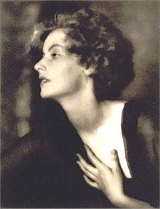
Greta Garbo
Greta Garbo born Greta Lovisa Gustafsson, was a Swedish born actress and Hollywood icon.
Sourced
- I never said, "I want to be alone." I only said, "I want to be let alone! There is all the difference.
- Quoted in John Bainbridge, Garbo (1955)
- As the Russian ballerina Grusinskaya in Grand Hotel (1932), she had said "I want to be alone." These words had become associated with Garbo herself in the public imagination.
About Greta Garbo
- Her instinct, her mastery over the machine, was pure witchcraft. I cannot analyze this woman's acting. I only know that no one else so effectively worked in front of a camera.
- Bette Davis, in The Lonely Life : An Autobiography (1962), p. 116
- She is the most miraculous blend of personality and sheer dramatic talent that the screen has ever known and her presence in The Painted Veil immediately makes it one of the season's cinema events.
- Andre Sennwald, in The New York Times (1934), as quoted in The Films of Greta Garbo (1963) by Michael Conway, Dion McGregor and Mark Ricci, p. 126
- You're the top! You're the National Gallery. You're the top! You're Garbo's salary.
- Cole Porter, "You're the Top" from Anything Goes (1934)
- Garbo is lonely. She always has been and she always will be. She lives in the core of a vast aching aloneness. She is a great artist, but it is both her supreme glory and her supreme tragedy that art is to her the only reality. The figures of living men and women, the events of everyday existence, move about her, shadowy, unsubstantial. It is only when she breathes the breath of life into a part, clothes with her own flesh and blood the concept of a playwright, that she herself is fully awake, fully alive.
- Marie Dressler, My Own Story as Told to Mildred Harrington (1934)
- What, when drunk, one sees in other women, one sees in Garbo sober.
- Kenneth Tynan, "Greta Garbo," Sight and Sound (April 1954), republished in Profiles (Harper Collins, 1990, ISBN 0-06-096557-6), p. 79
- Except physically, we know little more about Garbo than we know about Shakespeare.
- Kenneth Tynan, "Greta Garbo," Sight and Sound (April 1954), republished in Profiles (1990), p. 80
- The mystery surrounding Garbo was as thick as a London fog.
- Tallulah Bankhead, Tallulah: My Autobiography (1952), ch. 9: Duels with the Screen
- Garbo still belongs to that moment in cinema when capturing the human face still plunged audiences into the deepest ecstasy, when one literally lost oneself in a human image as one would in a philtre, when the face represented a kind of absolute state of the flesh, which could be neither reached nor renounced.
- Roland Barthes, "The Face of Garbo," Mythologies (1957), trans. Annette Lavers [Farrar, Straus, 1986, ISBN 8090-1369-X/0470], p. 56
